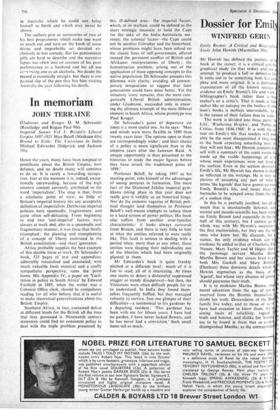In memoriam
JOHN TERRAINE
Gladstone and Kruger D. M. Schreuder (Routledge and Kegan Paul 90s) Imperial Sunset Vol I: Britain's Liberal Empire 1897-1921 Max Beloff (Methuen 65s) Bound to Exile: The Victorians in India Michael *Edwardes (Sidgwick and Jackson 50s)
Down the years, many have been tempted to pontificate about the British Empire, now defunct, and no doubt many will continue to do so. It is rarely a 'rewarding occupa- tion. Just at the moment it is, indeed, excep- tionally unrewarding, because of the high emotive content currently attributed to, the word 'imperialism'. The snag is that, from a scholastic point of view, so little of Britain's imperial history fits any acceptable definition of imperialism. Deliberate imperial policies were spasmodic, fragmentary, and quite often self-defeating. From beginning to end two `anti-imperial' factors were always at work and, also in a spasmodic and fragmentary manner, it was these that finally triumphed: the planting and transplanting of a concept of liberty enshrined in the British constitution—and sheer ignorance.
Africa probably supplies the best example of this double force at work. Dr Schreuder's book, 523 toages of text and appendices, admirably researched and annotated, with much valuable fresh material and a coolly sympathetic perspective, rams the point home. His Appendix IV, a paper on 'Vacil- lation in policy in South Africa' by Edward Fairfield in 1885, when the writer was a Colonial Office clerk, should be compulsory reading for all who believe that it is useful to make theoretical generalisations about the British Empire.
Southern Africa, in fact, contained defeat at different levels for the British all the time that they possessed it. Nineteenth century statesmen could find no consistent policy to deal with the triple problem presented by this ill-defined area : the imperial factor, which, at its starkest, could be defined as the sheer strategic necessity to hold the Cape for the sake of the India-Australasia sea- route; the colonial factor—the Cape could not be another Gibraltar and the hinterland, whose problems might have been solved on the classic lines of self-government, offered instead the persistent conflict of British and Afrikaner interpretations of liberty ; the humanitarian problem, arising out of the application of these opposing concepts to the native population. Dr Schreuder presents this dilemma with clarity, avoiding all contem- porary temptations to suggest that later generations could have done better. Yet the minatory irony remains, that the most cate- gorically Liberal British administration, under Gladstone, succeeded only in ensur- ing the ultimate triumph of the most illiberal element in South Africa, whose prototype was Paul Kruger.
Dr Schreuder's point of departure (in time) is a most useful one. As he says: 'Men and minds were more flexible in 1880 than twenty years later. The options open to them are correspondingly wider ; and their choice of a policy is more significant than in the emotive years after the Jameson Raid. A unique opportunity is thus presented to the historian to study the major figures before they have struck the traditional poses of 1899.'
Professor Beloff, by taking 1897 as his starting-point, robs himself of the advantages of seeing postures in formation. The mere fact of the Diamond Jubilee imperial gym- khana taking place in that year does not really give it validity as an historical hinge. Nor do the endemic vagaries of British poli- tical thought lend themselves to Professor Beloff's well-meant attempts to reduce them to a lucid system of power politics. His book also suffers from another over-familiar characteristic: it looks always outwards from Britain, and there is very little to hint at what the entities referred to were really like. This fault is serious in dealing with a period when, more than at any other, those entities were shaping their individuality out of the liberties which had been originally planted in them.
Mr Edwardes's book is quite frankly pitched at a different level: much of it is fun to read, all of it interesting. At times one seems to detect a distasteful suppressed snigger or trendy disapproval—but then, the Victorians were often difficult people for us to understand. In India they found them- selves frequently baffled, but they managed robustly to survive. Just one glimpse of their difficulties—a testimonial to his gardener by a departing resident: 'This gardener has been with me for fifteen years. I have had no garden, I have never lacked flowers, and he has never had a conviction.' Such small items tell us much.






































 Previous page
Previous page